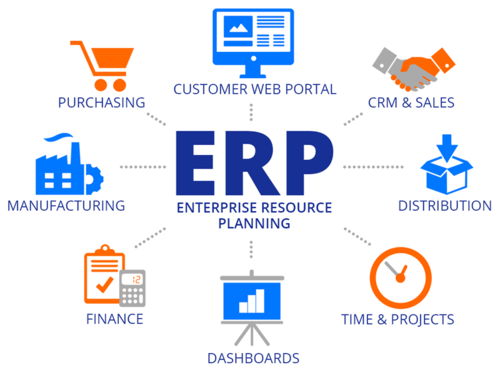Enterprise resource planning (ERP) is a process used by companies to manage and integrate the important parts of their businesses. Many ERP software applications are important to companies because they help them implement resource planning by integrating all of the processes needed to run their companies with a single system. An ERP software system can also integrate planning, purchasing inventory, sales, marketing, finance, human resources, and more.
- ✔ ERP software can integrate all of the processes needed to run a company.
- ✔ ERP solutions have evolved over the years, and many are now typically web-based applications that users can access remotely.
- ✔ An ERP system can be ineffective if a company doesn't implement it carefully.

Understanding Enterprise Resource Planning
You can think of an enterprise resource planning system as the glue that binds together the different computer systems for a large organization. Without an ERP application, each department would have its system optimized for its specific tasks. With ERP software, each department still has its system, but all of the systems can be accessed through one application with one interface.
ERP applications also allow the different departments to communicate and share information more easily with the rest of the company. It collects information about the activity and state of different divisions, making this information available to other parts, where it can be used productively.
ERP applications can help a corporation become more self-aware by linking information about the production, finance, distribution, and human resources together. Because it connects different technologies used by each part of a business, an ERP application can eliminate costly duplicate and incompatible technology. The process often integrates accounts payable, stock control systems, order-monitoring systems, and customer databases into one system. ERP offerings have evolved over the years from traditional software models that make use of physical client servers to cloud-based software that offers remote, web-based access.
Special Considerations
An ERP system doesn't always eliminate inefficiencies within the business. The company needs to rethink the way it's organized, or else it will end up with incompatible technology.
ERP systems usually fail to achieve the objectives that influenced their installation because of a company's reluctance to abandon old working processes that are incompatible with the software. Some companies are also reluctant to let go of old software that worked well in the past. The key is to prevent ERP projects from being split into many smaller projects, which can result in cost overruns.
Our consultants are among the most skilled in the industry. We have extensive experience managing hundreds of successful ERP and CRM implementations, training programs and continuous improvement initiatives. We offer a broad range of consulting services to drive maximum benefit from your ERP or CRM software investment and help you gain competitive advantage through operating more productively and profitably.
- ✔ ERP software installation
- ✔ Product Configuration
- ✔ Business Consulting
- ✔ Technical Consulting
- ✔ Project Consulting
- ✔ Project Management
- ✔ Product Customization
- ✔ System Admin Training
- ✔ End User Training
- ✔ Database Creation & Load
- ✔ Data Migration